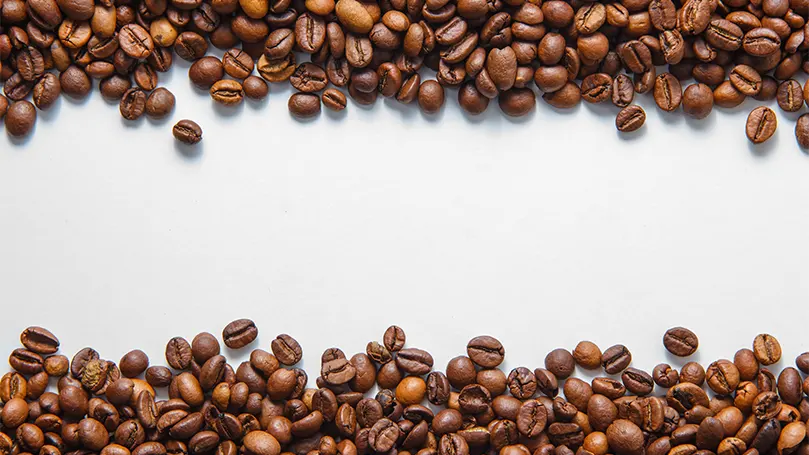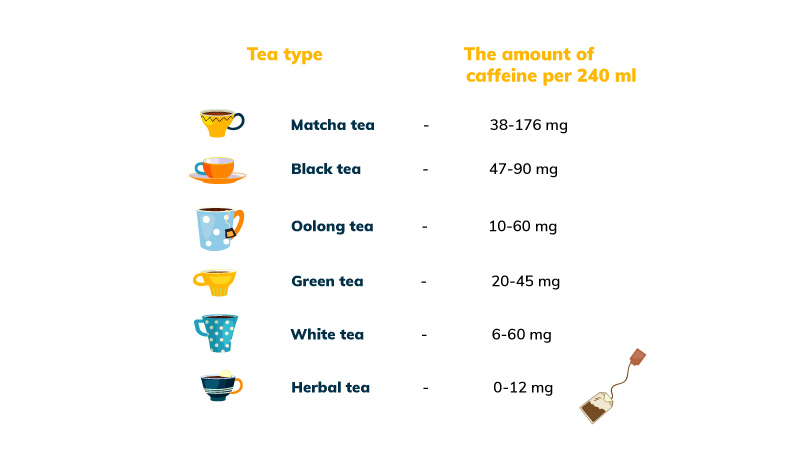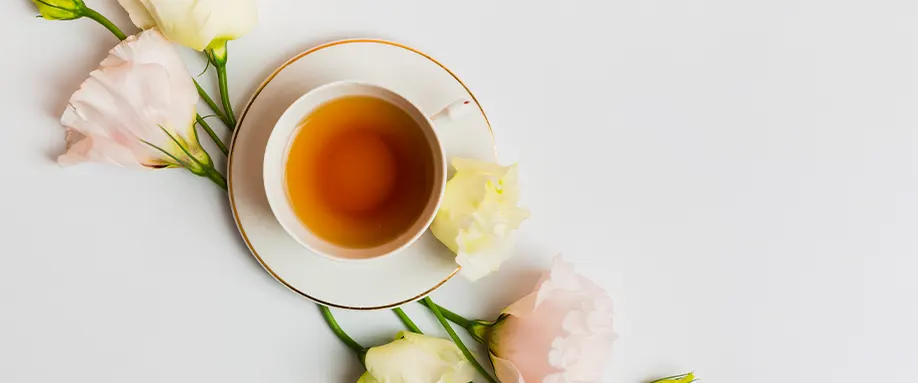Can drinking tea affect your sleep?
Whenever caffeine content is mentioned, many people immediately think about brewed coffee. And for good reason – as if you just brew coffee beans in water, you can expect up to 100 mg of caffeine in a single cup.
However, some types of tea have a much higher caffeine content than you'd think. Sure, green and white teas shouldn't keep you up at night. But getting a strong black tea can pack the same wallop as some coffees! So, drinking it in the evening can cause adverse effects.
Plus, it's important to keep in mind that even drinking a cup of green tea can add up during the day. This is because caffeine consumption isn't bound to a single drink! For example, if you've already had a cup of coffee, an energy drink, and some chocolate, even a cup of green tea can bump your caffeine levels high enough to make sleep harder. So, roughly knowing what caffeinated beverages you've had during the day is also an important factor.
Why is it important to control your caffeine intake?

As we've mentioned in our “How does drinking coffee affect your sleep” article, caffeine sticks around for a lot longer than some people think. In fact, according to a study, it takes 5 hours for just half of the caffeine to be fully absorbed. And this applies to the caffeine in tea as much as it does to coffee.
But why does it matter? Well, the most obvious answer is that it affects your sleep. The more caffeine you have, the more difficult it can be to fall asleep at night and thus be well-rested the following day. However, caffeine also comes with other potential drawbacks like addiction, digestion issues and in some rare cases, even overdosing.
Of course, these are mostly extreme examples and having a cup of tea a day likely won't do you any harm. However, it should contextualize why knowing the caffeine content of different beverages is important in the long run. So, let's go over some general stats and then give you an exact breakdown.
Which tea has the least caffeine?
Although all tea is made from the same plant, they can vary drastically when it comes to caffeine content. It all depends on which parts of the tea plant were used and how the tea leaves were processed.
For example, black tea typically has the highest caffeine content, rivalling certain coffees. So, drinking it in the afternoon or the evening will likely keep you awake. However, a good herbal tea probably won't cause such issues as they're naturally caffeine-free!
Not to mention that you can get a decaffeinated tea at most cafes or shops that have a very specific, and often delicious, flavour profile – like cinnamon! So, even if you don't like typical herbal teas, you can still order something that has no caffeine whatsoever.
But it's not necessary. Green tea, and white tea – they have relatively low caffeine levels. So, if you want to have less caffeine, just pick from the green teas or herbal infusions section and you should be fine. However, do note that matcha green tea is a bit different, as it heavily depends on the amount of matcha used.
Amount of caffeine in different types of tea

Now that we all know why keeping your caffeine levels down is important for sleep, and which tea types have more or less caffeine, let's talk about specifics. So, we've made this custom table so that you can quickly check the exact caffeine amount of your favourite teas!
As you can see, matcha tea has the biggest range. This is because it heavily depends on the exact preparation method as well as the amount of matcha used per cup. In the table above, we've calculated the possible amounts for a cup of tea with 2 grams of matcha but you could use more or less than that.
How much tea can you safely drink?
Now that we've laid out all the different caffeine amounts among the different tea types, you might wonder whether you should avoid tea altogether. And the short answer is – you shouldn't.
After all, tea comes with some amazing health benefits, helps you get into gear in the morning, helps you relax, and is generally delicious. What you should do however is be aware.
The average adult can consume 400 mg of caffeine in a day without any risk. However, we will note that for pregnant women, people with heart issues, or other preexisting conditions, this number might vary. Nevertheless, by doing some basic math, we can see that even if you took the strongest matcha tea on the market and had two regular cups, you'd still be safe.
So, it's not like you have to cut tea or coffee out completely! Just keep in mind that if you had chocolate or coffee that day, you should probably go for a herbal tea in order to be safe. And as a general rule of thumb, don't consume caffeinated drinks 6 hours before you plan to go to bed – especially if you already have trouble falling asleep.
Spread the word
FAQs
It heavily depends on the tea in question. The average cup of black coffee has around 95 mg. A cup of black tea can have up to 90 mg in some cases. However, matcha tea is harder to categorize. A cup of matcha that only uses 2 grams of tea will only have 38 mg of caffeine. However, this number can easily go over 100 if more matcha is used.
Generally speaking, herbal teas have no or very small traces of caffeine. Even when caffeine is present, it's usually under 12 mg per cup, making it unlikely to cause adverse effects.
Herbal teas are naturally caffeine-free. Decaffeinated teas on the other hand take teas that had caffeine and then process them in order to severely lessen the amount. A typical decaffeinated tea only has small traces of caffeine (around 2 mg).















There are no comments yet
"*" indicates required fields